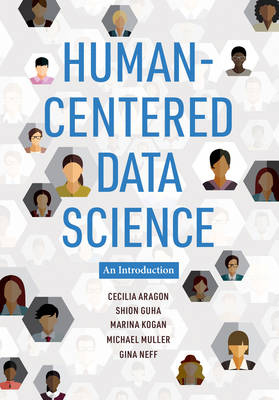
- Afhalen na 1 uur in een winkel met voorraad
- Gratis thuislevering in België vanaf € 30
- Ruim aanbod met 7 miljoen producten
- Afhalen na 1 uur in een winkel met voorraad
- Gratis thuislevering in België vanaf € 30
- Ruim aanbod met 7 miljoen producten
Zoeken
Human-Centered Data Science
An Introduction
Cecilia Aragon, Shion Guha, Marina Kogan, Michael Muller, Gina Neff
Paperback | Engels
€ 51,45
+ 102 punten
Omschrijving
Best practices for addressing the bias and inequality that may result from the automated collection, analysis, and distribution of large datasets. Human-centered data science is a new interdisciplinary field that draws from human-computer interaction, social science, statistics, and computational techniques. This book, written by founders of the field, introduces best practices for addressing the bias and inequality that may result from the automated collection, analysis, and distribution of very large datasets. It offers a brief and accessible overview of many common statistical and algorithmic data science techniques, explains human-centered approaches to data science problems, and presents practical guidelines and real-world case studies to help readers apply these methods. The authors explain how data scientists' choices are involved at every stage of the data science workflow--and show how a human-centered approach can enhance each one, by making the process more transparent, asking questions, and considering the social context of the data. They describe how tools from social science might be incorporated into data science practices, discuss different types of collaboration, and consider data storytelling through visualization. The book shows that data science practitioners can build rigorous and ethical algorithms and design projects that use cutting-edge computational tools and address social concerns.
Specificaties
Betrokkenen
- Auteur(s):
- Uitgeverij:
Inhoud
- Aantal bladzijden:
- 200
- Taal:
- Engels
Eigenschappen
- Productcode (EAN):
- 9780262543217
- Verschijningsdatum:
- 1/03/2022
- Uitvoering:
- Paperback
- Formaat:
- Trade paperback (VS)
- Afmetingen:
- 214 mm x 290 mm
- Gewicht:
- 544 g

Alleen bij Standaard Boekhandel
+ 102 punten op je klantenkaart van Standaard Boekhandel
Beoordelingen
We publiceren alleen reviews die voldoen aan de voorwaarden voor reviews. Bekijk onze voorwaarden voor reviews.











